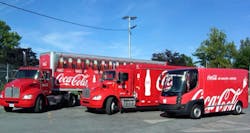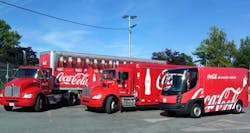Trucks Go Electric with Power Electronics (.PDF Download)
Without much fanfare, some of the world’s largest corporations have started to employ electric trucks. Companies that now count electric delivery trucks among their fleet include Coca Cola (Fig. 1), Frito Lay, and UPS in the U.S., and Heineken in the Netherlands. To pursue this emerging trend, major truck manufacturers are planning to produce new electric trucks. Plus, electric-vehicle (EV) pioneer, Tesla, will introduce its own electric truck in 2017.
1. Coca Cola uses electric trucks to deliver products.
The move to electric power has been on the rise. Every day, several million trucks shuttle among warehouses, distribution centers, retail stores, homes and offices, delivering everything from potato chips to cases of soda. Every night they’re back in the garage, and the next morning they’re charged up and ready to go. Their job is to move products using the lowest-operating-cost vehicle—the electric truck.
Electric trucks fit in a variety of jobs that depend on their gross vehicle weight rating (GVWR). The table lists these classifications for U.S. trucks. Electric trucks now go as high as Class 8.
The recently introduced eCanter, from Daimler’s Mitsubishi FUSO division, is said to be the world's first fully electric-powered light truck (Fig. 2). Lithium-ion battery packs power its 185-kW permanent magnet synchronous motor that provides 380 Nm of torque. Power is transferred to the rear axle by a standard single-speed transmission. Maximum speed is 55 mph, and it can carry a payload from 4,000 to 9,000 lbs., depending on the distance traveled and traffic conditions. It’s able to drive for 80 to 90 miles, road conditions withstanding, which is enough for city work.

